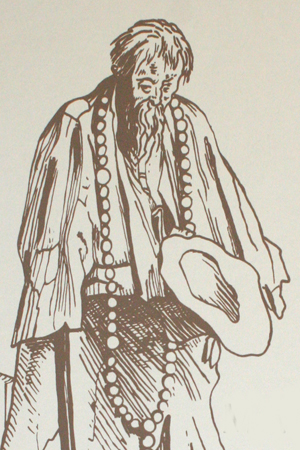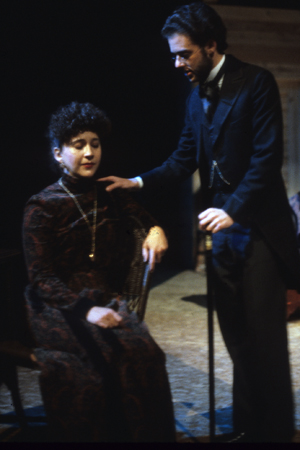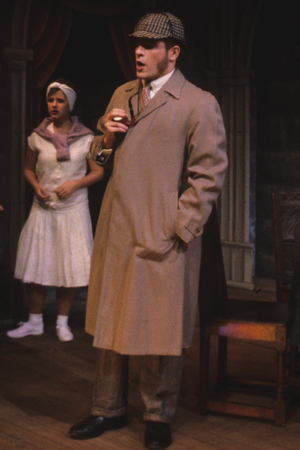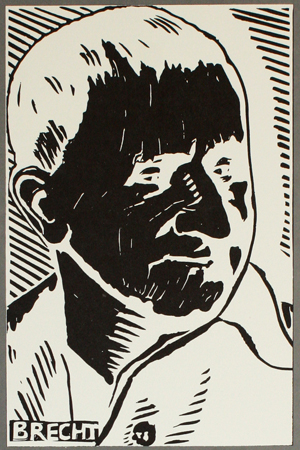The Mandrake
October 5-8, 1983
A play by Niccolo Machiavelli
Translated by Wallace Shawn
Production Staff
Director: James Fisher
Scenic and Lighting Designer: Kenneth Kloth
Costume Designer: Laura Conners
Stage Manager: Eric Hiser '86
Student Assistants: Cho Ky Pham '84, Jim Kurtz '85, Chris Ferris '86, Jerry Shelton
Cast List
Callimac: Kyle Carr '85
Sir: Kenneth Ogorek '87
Liguri: Curt Hunter '87
Lord Nicia: Adam Crowe '85
Lucrezia: Jennifer Ostermeier
Sostrata: Linda Ostermeier
Brother Timothy: Michael Abbott '85
A Woman: Susan Swan
A Beggar: Douglas Bradburn '84
Production Assistance
Sound: Brian Terpstra '85
Graphics: Laura Conners
Machiavelli’s The Mandrake, written sometime between 1512 and 1520, has been half-hidden for centuries in the shadow of The Prince. Only recently has the play received adequate academic recognition as the unrivaled masterpiece of Italian comic theater. T.B. Macaulay has said that The Mandrake “is superior to the best of Goldoni and inferior only to the best of Molière.”
This page is part of an ongoing project to document the history of the theatre productions performed at Wabash College. If you have information not included on this page, please contact the Theater Department.
A Doll's House
November 16-19, 1983
A play by Henrik Ibsen
Translated by Michael Meyer
Production Staff
Director: Dwight Watson
Assistant Director: Michael Abbott '85
Scenic and Lighting Designer: Kenneth Kloth
Costume Designer: Laura Conners
Stage Manager: Greg Hockemeyer '85
Asst. Stage Manager: Douglas Bradburn '84
Student Assistants: Cho Ky Pham '84, Jim Kurtz '85, Chris Ferris '86, Jerry Shelton
Cast List
Torvald Helmer: Peter Bankart
Nora: Dana K. Warner
Dr. Rank: Dan Jacoby '84
Mr. Linde: Linda Ostermeier
Nils Krogstad: Abbott A. Smith '85
Ivar: Jason Foos
Bob: Ben Swan
Emmy: Meghan Carlson
Anne-Marie: Linda Stover
A Porter: Douglas Bradburn '84
Production Assistance
Sound: Rodney Arnett '85
Light Crew: Lee Darmon '84, Tim Wohlford '84
Stage Crew: Whitney Stuart '85
Graphics: Laura Conners
Henrik Ibsen was the pioneer who opened the new frontiers of the modern drama and violated all the unwritten taboos of the nineteenth-century theater. Whatever theme he touched, Ibsen brought light into the dark corners of the soul and the society, and with it his grim humor, scathing irony, and his wealth of compassionate understanding for weak and fallible humanity. In A Doll's House, one of his finest plays, Ibsen fought against the subjugation of modern woman.
This page is part of an ongoing project to document the history of the theatre productions performed at Wabash College. If you have information not included on this page, please contact the Theater Department.
The Real Inspector Hound
February 8–11, 1984
A play by Tom Stoppard
Production Staff
Director: Dwight Watson
Assistant Director: John Hiester '86
Scenic and Lighting Designer: Kenneth Kloth
Costume Designer: Laura Conners
Stage Manager: Abbott Smith '85
Student Assistants: Jim Kurtz '85, Chris Ferris '86, John McGovern '87, Michael Abbott '85, Jerry Shelton
Cast List
Moon: Dan Jacoby '84
Birdboot: Michael Abbott '85
Mr. Drudge: Michael Beason '86
Simon: Stig Hammond '84
Felicity: Jennifer Ostermeier
Cynthia: Jamie Ritchie Watson
Magnus: Greg Hockemeyer '85
Inspector Hound: John Ohmer '84
BBC Voice: Tim Thobe '84
Production Assistance
Sound: Ben McCormick '84
Graphics: Laura Conners
Tom Stoppard, author of such plays as Rosencrantz and Guildenstern are Dead and Travesties, turned savage satire in The Real Inspector Hound. Stoppard has become one of the most widely acclaimed of the current English dramatists and his works are produced regularly in European and American theaters. Of The Real Inspector Hound, the London Observer said, “…it’s time we stopped dismissing comedy as an inferior genre, and thanked Heaven for a new comic master.”
This page is part of an ongoing project to document the history of the theatre productions performed at Wabash College. If you have information not included on this page, please contact the Theater Department.
Galileo
April 11–14 and May 11–12, 1984
A play by Bertolt Brecht
Production Staff
Director: James Fisher
That the word “Brechtian” has entered the vocabulary of theater and film criticism and is to be found not only in professional journals but in the popular press as well, would testify to the profound influence Bertolt Brecht and his “epic theater” have had on the contemporary theater world. More than an historical drama, Galileo poses many troubling questions in an age of increased technology and scientific discovery “…Galileo is entirely contemporary in view of the events of our atomic age and in relation to certain problems of conscience.”
This page is part of an ongoing project to document the history of the theatre productions performed at Wabash College. If you have information not included on this page, please contact the Theater Department.




